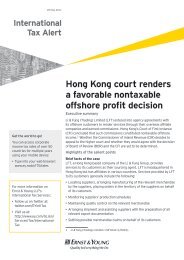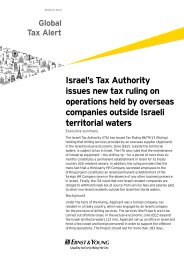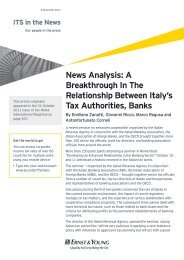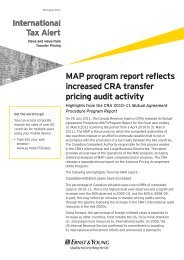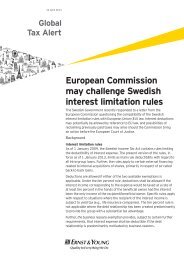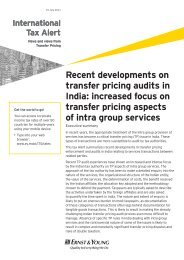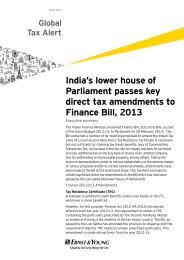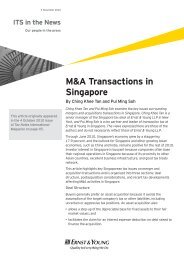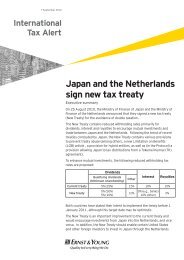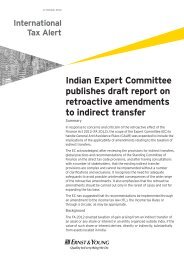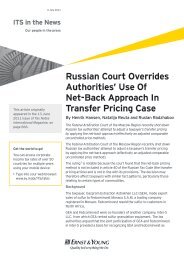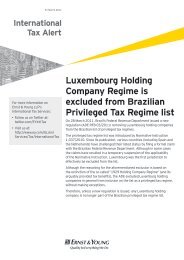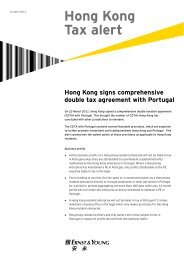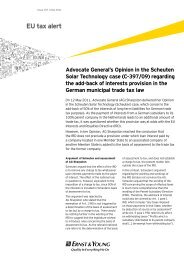Download - Ernst & Young T Magazine
Download - Ernst & Young T Magazine
Download - Ernst & Young T Magazine
You also want an ePaper? Increase the reach of your titles
YUMPU automatically turns print PDFs into web optimized ePapers that Google loves.
factors were economic opportunities, access to<br />
local markets and family ties.<br />
For highly skilled scientists and technology<br />
workers, there are yet other factors. According<br />
to a 2008 OECD publication, The Global<br />
Competition for Talent: Mobility of the Highly<br />
Skilled, these workers also seek better research<br />
funding and research infrastructure, the<br />
opportunity to work with “star” scientists and<br />
more freedom to debate.<br />
Government programs and policies<br />
Governments across the world continue to<br />
create a wide repertoire of programs to help<br />
draw highly skilled expats home. China’s list<br />
alone is huge. To encourage students to return,<br />
the Government there has set up educational<br />
bureaux in its embassies and consulates as well<br />
as several thousand student associations.<br />
Universities and government-funded research<br />
organizations actively recruit returnees. One<br />
initiative, The Thousand Talents Program, offers<br />
incentives to top researchers to come home,<br />
including a one-time, tax-free cash allowance of<br />
¥1 million (US$159,000), and a residency<br />
permit in whichever city they choose, among<br />
other benefits. Some cities have created<br />
“enterprise incubators” for returnees.<br />
The United Arab Emirates has made its expat<br />
workers aware of employment opportunities<br />
back home by creating an online platform called<br />
Return2Home. The initiative targets Emirati<br />
jobseekers in the US, UK, Canada, India and<br />
South East Asia, as well as employers seeking<br />
non-resident Emiratis with international<br />
experience and expertise.<br />
With many skilled expats being increasingly<br />
“pulled” home, the countries currently hosting<br />
these expats have an equally large stake in<br />
encouraging them to stay. According to Liley,<br />
“How well a country integrates its talent will<br />
have a high impact on whether that talent comes<br />
to consider the host society home. For example,”<br />
he says, “countries such as Sweden and other<br />
Nordic countries have provided language training<br />
for numerous years, which is the key to<br />
connecting with the local population and<br />
integrating into the society.<br />
In some cases, immigration policies create<br />
barriers to workers who might otherwise wish to<br />
stay in a host country. For example, the US is<br />
experiencing an exodus of skilled foreign<br />
workers, particularly in crucial fields of science,<br />
technology, engineering and mathematics.<br />
“Many of these people are leaving simply<br />
because they cannot get permanent visas to<br />
stay in the US after their student or training<br />
visas expire,” says Rooney. Another approach is<br />
to ease immigration policies that prevent needed<br />
talent from entering. Like the US, the UK faces<br />
shortages of skilled workers, particularly in<br />
certain sectors. The British Business Secretary<br />
Vince Cable stated in 2011 that the UK’s<br />
aerospace industry faces a serious, chronic<br />
shortage of engineers; he believes certain<br />
immigration caps are partly to blame.<br />
Governments can also change immigration<br />
rules to make it easier for expats to return. For<br />
example, in Canada, a pilot program was<br />
launched in 2011 to encourage Canadian expats<br />
in certain sectors facing significant shortages,<br />
such as health care and academic research, to<br />
return home by easing immigration restrictions<br />
on non-Canadian spouses.<br />
Education is also on the move<br />
Working professionals are one facet, but<br />
students are also crucial here. Vast numbers of<br />
students in developing economies leave home<br />
each year to attend Western institutions of<br />
higher education. That fact has not been lost on<br />
Western business schools. INSEAD, a top<br />
European business school, has a campus in<br />
Singapore, and other schools, such as the<br />
University of Pennsylvania’s Wharton School,<br />
have established campuses abroad for their<br />
executive-MBA programs. Local business schools<br />
in countries such as India and China are also<br />
appearing at a rapid pace.<br />
Science and technology research institutions<br />
are globalizing more slowly. However, a new<br />
publication, OECD Science, Technology and<br />
Industry Scoreboard 2011: Innovation and<br />
Growth in Knowledge Economies, indicates<br />
that there is evidence that some universities in<br />
Asia are emerging as leading research<br />
institutions. With non-OECD economies<br />
accounting for a growing share of the world’s<br />
R&D (measured in terms of both number of<br />
researchers and R&D expenditures), it is<br />
reasonable to expect that, over time, additional<br />
research institutions in these regions will<br />
continue to emerge and grow; these will further<br />
support shifting brain flows.<br />
Talent at stake<br />
Employers face somewhat different concerns in<br />
managing talent flows from an HR point of view.<br />
But whether the issue at hand is retaining valuable<br />
immigrant employees or encouraging people to<br />
come home, “companies need to focus on the<br />
opportunities they create for employees,” says<br />
Michael Dickmann, Professor of International HRM<br />
at the UK’s Cranfield School of Management and<br />
co-author of Global Careers. “This goes far beyond<br />
monetary issues. I believe it is about the very clear<br />
development of employees and the way companies<br />
manage their talent. We consistently see that, in<br />
the range of drivers for people who work globally,<br />
these are the strongest.”<br />
In his book, Dickmann notes that what was<br />
once a clear brain drain, where the talent flow was<br />
one-way, is now changing to what he terms “brain<br />
circulation,” with mutual sharing of talent and<br />
learning. In an increasingly interconnected world,<br />
this circulation will only continue to increase. And<br />
those capturing the top minds, regardless of their<br />
origin, will benefit most.<br />
¥1m<br />
The one-time, tax-free cash<br />
allowance that one of China’s<br />
initiatives – The Thousand<br />
Talents Program – offers to top<br />
researchers to come home,<br />
amounting to about<br />
US$159,000.<br />
70%<br />
The approximate percentage<br />
of expatriates, as a proportion<br />
of the total population, in the<br />
United Arab Emirates, the<br />
highest such ratio in the world.<br />
<strong>Ernst</strong> & <strong>Young</strong> Issue 07 T <strong>Magazine</strong> 35



